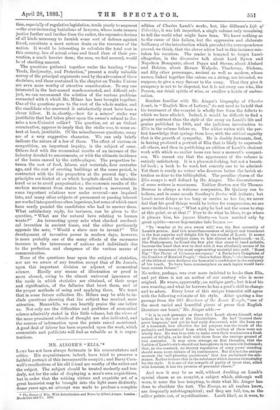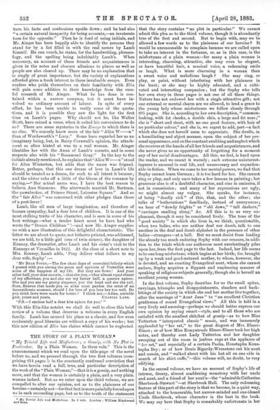MR. AINGER'S " ELIA."*
LAMB has not been always fortunate in his commentators and critics. His acquaintances, indeed, have tried to preserve a faithful portrait of this incomparable essayist ; and Barry Corn- wall's recollections of his old friend are worthy of the writer and the subject. The subject should be treated modestly and ten- derly, not for the sake of displaying a man's own acquisitions, but in order that the retiring virtues and exquisite art of a great humorist may be brought into the light more distinctly. Some years ago, an attempt was made to produce a complete • The ERsaye of Elie. With Introduction and Notes by Alfred Ainger. London : Macre:Han and Co. 1883. edition of Charles Lamb's works, but, like Gillman's life of Coleridge, it was left imperfect, a single volume only remaining
to tell the world what might have been. We know nothing as to the cause of this failure, but the oppressive and elaborate brilliancy of the introduction which preceded the correspondence proved, we think, that the clever editor had in this instance mis- taken his vocation. The reader is tempted to forget Lamb. altogether, in the discursive talk about Lord Byron and Napoleon Bonaparte, about Pepys and Sterne, about Abelani and Heloise, about Horace Walpole, Thackeray, Dickens, and fifty other personages, ancient as well as modern, whose names, linked together like onions on a string, are intended, we- suppose, to give a racy flavour to the essay. That they give it pungency is not to be disputed, but it is not every one who, like Porson, can drink spirits of wine, or swallow a bottle of embro- cation.
Readers familiar with Mr. Ainger's biography of Charles Lamb, in "English Men of Letters," do not need to be told that his treatment of the essayist is wholly free from the defects to. which we have alluded. Indeed, it would be difficult to find a greater contrast than the style of the essay on Lamb's life and genius published in 1868, and the judicious introduction to Ella in the volume before us. The editor writes with the per- fect knowledge that springs from love, with the critical sagacity that is the growth of sympathy. He is doubly fortunate, first, in having produced a portrait of Ella that is likely to supersede all others, and then in publishing an edition of Lamb's choicest work with which no earlier issue can bear a moment's compari- son. We cannot say that the appearance of the volume is entirely satisfactory. It is a pleasant-looking, but not a beauti- ful book ; a book to be used, but scarcely one to be admired.
Yet there is surely no writer who deserves better the lavish at- tention so dear to the bibliophilist. The peculiar charm of the Ella essays is well defined by Mr. Ainger. The discursiveness- of some writers is wearisome. Neither Burton nor Sir Thomas Browne is always a welcome companion, De Quincey can be tedious, and in some moods Soathey's Doctor will irritate; but Lamb never delays us too long or carries us too far, we never feel that his good things would be better for compression, we are never inclined to say," What a pity he had not the sense to stop at this point, or at that !" Free to do what he likes, to go where it pleases him, his joyous liberty—a boon merited only by great spirits—never degenerates into licence :—
"To wander at its own sweet will,' was the first necessity of Lamb's genius. And this miscellaneousness of subject and treatment is the first surprise and delight felt by the reader of Lamb. It seems- as if the choice of subject came to him almost at haphazard,—as if,. like Shakespeare, he found the first plot that came to hand suitable, because the hand that was to deal with it was absolutely secure of its power to transmute the most unpromising material into gold. 'Roast Pig,' 'The Praise of Chimney-sweepers,' 'A Bachelor's Complaint of the Conduct of Married People," Grace before Meat,'—the incongruity of the titles at once declares the humorist's confidence in the certainty of his touch. To have been commonplace on such topics would have- been certain failure."
No writer, perhaps, was ever more indebted to books than Elia, and yet there is not an author of our century who is more- original. He wears, apparently, an antique garb ; but it is of his own weaving, and what he borrows he has a poet's skill to change and to adorn. Every lover of this unique humorist will agree with the following estimate of his style. After quoting a fine passage from the Old Benchers of the Inner Temple, "one of the most varied and beautiful pieces of prose that English literature can boast," Mr. Ainger adds :—
" It is in such passages as these thvt Lamb shows himself, what indeed, be is, the last of the Elizabethans. He had 'learned their- great language,' and yet be had early discovered, with the keen eye of a humorist, how effective for his purpose was the touch of the pedantic and fantastical from which the noblest of them were not wholly free. He was thus able to make even their weaknesses afresh source of delight, as he dealt with them from the vantage ground of two centuries. It may seem strange, on first thoughts, that the- fashion of Lamb's style should not have grown in its turn old-fashioned; that, on the contrary, no literary reputation of sixty years' standing should seem more certain of its continuance. But it is not the antique manner, the 'self-pleasing quaintness,' that has embalmed the sub- stance. Rather is there that in the substance which insures immortality for the style. It is one of the rewards of purity of heart that, allied. with humour, it has the promise of perennial charm."
And now it may be as well, without dwelling on Lamb's special charm as an essayist, a subject which, although well worn, is none the less tempting, to state what Mr. Ainger has done to elucidate the text. The Essays, as all readers know, are frequently autobiographical ; and they are full, too, as the editor points out, of mystifications. Lamb liked, as it were, to
turn his facts and confessions upside down ; and he had also "a certain natural incapacity for being accurate,—an inveterate turn for the opposite." Then he is fond of using initials, and Mr. Ainger has been happily able to identify the persons they
-stand for by a list filled in with the real names by Lamb himself. He can vouch, he states, for the handwriting, phraseo- logy, and the spelling being indubitably Lamb's. When 'necessary, an account of these friends and acquaintances is -given in the notes and obscure allusions to places as well as people are also cleared up. There may be no explanation that
is singly of great importance, but the variety of explanations .afforded gives a fresh interest to these invaluable essays. Even 'readers who pride themselves on their familiarity with Ella -wil I gain some addition to their knowledge from the care- ful research of Mr. Ainger. What he has done is con- tained within a narrow compass, but it must have in- -volved no ordinary amount of labour. in spite of every
-effort, he has been unable to verify some of the quota- tions, and it is possible they saw the light for the first time on Lamb's pages. Why should not he, like Walter cott, have coined a verse, when it suited his convenience to do
so ? There are some mysteries in the Essays to which there is no clue. We scarcely know more of the fair "Alice W—n" than of Wordsworth's "Lucy." Some have regarded her as an imaginary being, but, in Barry Cornwall's opinion, the attach- ment so often hinted at was to a real woman. Mr. Ainger identifies her with the Anna of Lamb's sonnets, and in some respects also with his "Rosamond Gray." In the key to the initials already mentioned, he explains that "Aliee "stood for Alice Winterton, but adds that the name was feigned.
Better, perhaps, that this one dream of love in Lamb's life -should be treated as a dream, for such to all intent it became ;
and the editor rubs off a little of the bloom of the romance by saying,—" Her actual name was, I have the best reason to
'believe, Ann Simmons. She afterwards married Mr. Bartram, the pawnbroker, of Princes Street, Leicester Square." And so -the "fair Alice" was concerned with other pledges than those of a poet-lover !
Lamb, like all men of large imagination, and therefore of human sympathy, had a dear love of children. It is one of the most striking traits of his character, and is seen in some of his best writings—what a tender heart must he have had who wrote the "Dream Children" !—and. now Mr. Ainger supplies 'us with a new illustration of this delightful characteristic. The kletter we are about to quote, not hitherto printed, was addressed, we are told, to a little girl (one of twin sisters), the daughter of Kenney, the dramatist, after Lamb and his sister's visit to the Kenneys at Versailles in 1822. At the close of a short note to Mrs. Kenney, Lamb adds, 'Pray deliver what follows to my 'dear wife, Sophy'
MY DEAR SOPHY,—The few short days of connubial felicity which I passed with you among the pears and apricots of Versailles were some of the happiest of my life. But they are flown ! And your other half, your dear co-twin,—that she-yon,—that almost equal sharer of my affections, you and she are my better half, a quarter apiece.
he and you are my pretty sixpence, you the head and she the tail. .Sure, Heaven that made you so alike must pardon the error of an inconsiderate moment, should I for love of you love her too well. Do you think laws were made for lovers ? I think not.—Adieu, amiable
pair, yours and yours, CHARLES LAMB.
g P.S.—I enclose half a dear kiss apiece for you.'"
'With this Elia-like notelet we shall do well to close this brief review of a volume that deserves a welcome in every English
family. Lamb has secured his place as a classic, and few even moderately good libraries are without a copy of his works ; but -this new edition of Ella has claims which cannot be neglected.



































 Previous page
Previous page